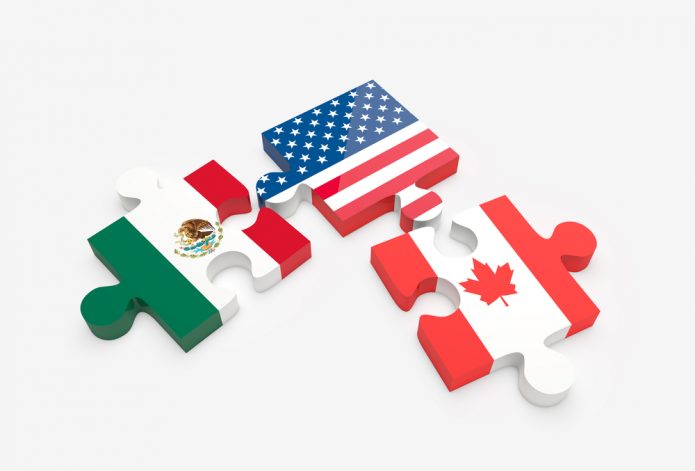
Shutterstock
The renegotiation of the North American Free Trade Agreement has reached a Kafkaesque stage. The talks have not been finalized, Canada could drop out, and the texts remain hidden from the public. Nevertheless, President Donald Trump is scoring big headlines trumpeting his deal-making prowess.
Much of the positive spin on the negotiations has focused on proposed changes to the treaty that would supposedly reduce inequality by lifting up workers in the United States and Mexico. New labor provisions, for example, would reportedly require Mexico to protect workers’ rights to secret ballot voting in union elections. But these and other rumored improvements in the deal are not yet public — and major questions remain regarding enforcement.
Trump is putting pressure on Canada to cave into his demands and sign a deal by October 1. The American president just wants to “trumpet the deal as a propaganda success in the lead-up to the U.S. November mid-term elections,” said Mexican Professor Alberto Arroyo Picard, of the coalition Mexico Better Without FTAs, in a statement. “Deadlines such as this one are nothing more than pressure tactics to force the trade negotiators into compromise.”
Mexican critics of U.S.-driven trade policies are upset that Trump is insisting on a revised pact before their new president, Andres Manuel López Obrador (AMLO), takes office on December 1, 2018. While he has recently declined to oppose the NAFTA renegotiations, López Obrador has in the past been critical of the free market approach. And he would very likely be a tougher negotiator than Mexico’s current lame-duck leader.
As I was quoted saying in the New York Times recently, ¨Mr. López Obrador believed that failed economic policies championed by the United States but also Mexican elites were one of the main causes of Mexicans being pushed off farms and on the path to immigration to the United States. He really doesn’t want to criticize NAFTA too much, because that would put him at odds with the business community and investors. But what he’s all about is strengthening the internal economy to focus on Mexico’s jobs and the countryside.”
Mexican fair trade advocates are particularly disturbed by reports that their current government has accepted to keep NAFTA provisions that allow private foreign investors to sue governments over disputes affecting certain industries. These just happen to be the industries that have provoked the most investor lawsuits: oil and gas, infrastructure, energy generation and telecommunications. The U.S. fossil fuel industry lobbied hard to protect their investments in Mexico’s newly liberalized upstream oil and gas as well as pipeline investments from government regulations that might reduce their profits.
But Mexico has reportedly not put up much resistance to the corporate lobbyists who want to maintain Chapter 11 of NAFTA, which lays out the Investor State Dispute Settlement (ISDS) mechanisms that give supranational rights to transnational corporations, allowing them to bypass domestic courts and bring claims for compensation to international tribunals.
This is paradoxical, since Mexico ranks fifth among the countries that have been the target of the most such investor-state lawsuits and has had to pay more than $200 million in “compensation” for profits lost over governmental decisions in favor of the public interest and the environment. Moreover, under pending suits under NAFTA and other investment treaties (notably with European countries,) it may be already liable to pay billions of dollars to transnational companies.
Canadian trade justice groups are calling on their government to stand up to Trump’s “divide and conquer” strategy and demand a fair trade deal for all of North America. “We call on the Canadian government to publish any agreed upon texts right away and that these secretive talks be replaced by an authentic consultative process involving legislators and civil society,” said Rick Arnold, Chair of the Council of Canadians Northumberland Chapter trade group. “Canada needs to stand up to the bullying and insults coming from the Trump White House and ensure a sustainable development end game that addresses growing inequalities that face most people in North America.”
One of Trump’s demands is that Canada lift protections on its dairy industry, including import quotas and a special pricing system that has made it more cost-effective for Canadian farmers to buy milk ingredients locally.
“Rather than destroy the Canadian dairy industry, we should be learning from their example and adopting policies that successfully balance supply and demand and lift up our own farmers,” said Sharon Treat, the Senior Attorney for the Institute for Agriculture and Trade Policy (IATP). “That’s why family farm groups in the United States have spoken out on the need to overhaul domestic dairy policy….rather than attacking Canada’s program.”
Trump’s threats to leave Canada out of NAFTA come as no huge surprise to Maude Barlow, the Council of Canadians Honorary Chairperson and a leading critic of corporate-driven globalization going back to the 1988 U.S.-Canada free trade agreement. “Trump’s announcement of a trade deal with Mexico shows what we said 30 years ago about free trade with the US: putting all our trade apples in one basket would give the U.S. government and American corporations too much power over Canada,” said Barlow. “We were right!”
With respect to Mexico, the newly elected government must ensure that preeminence is given to human and environmental rights of Mexican communities instead of yielding to investors’ demands. The renegotiation of NAFTA under the current terms and process is incompatible with AMLO’s new project for the nation.
